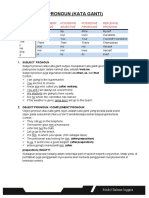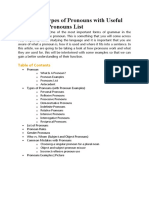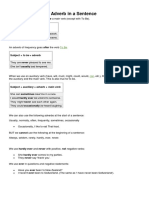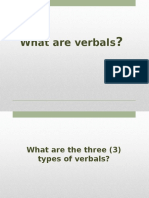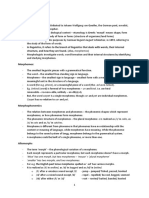08 Parts of Speech
08 Parts of Speech
Uploaded by
Heath SmithCopyright:
Available Formats
08 Parts of Speech
08 Parts of Speech
Uploaded by
Heath SmithOriginal Description:
Copyright
Available Formats
Share this document
Did you find this document useful?
Is this content inappropriate?
Copyright:
Available Formats
08 Parts of Speech
08 Parts of Speech
Uploaded by
Heath SmithCopyright:
Available Formats
WAJ3102 English Language Proficiency 1
TOPIC 1
PARTS OF SPEECH
1.1 Synopsis
This topic intends to help course participants to revise and analyse the features of
the Parts of Speech.
1.2 Learning outcomes
Speak fluently, correctly and confidently for a variety of purposes using
correct parts of speech.
Use correct nouns, pronouns and adjectives and appropriate language
structures in writing.
Speak fluently, correctly and confidently using verbs and adverbs for a
variety of purposes.
Read and discuss the functions of verbs and adverbs.
Use correct and appropriate verbs and adverbs in different types of
writing.
1.3 Topic Framework
Content
PARTS OF SPEECH
NOUNS
VERBS
ADJECTIVES
PRONOUNS
ADVERBS
1.4 Parts of Speech in English
MND/2011
Page 1
WAJ3102 English Language Proficiency 1
Parts of speech/Word class are the basic types of words that make up a sentence.
There most important parts of speech in English include nouns, pronouns, verbs,
adverbs, adjectives, prepositions, conjunctions and interjections.
Here are the eight parts of speech and their most common meanings:
Part of
speech
function or "job"
examples
(words)
examples (sentences)
Noun
is naming a thing, a
person, a place,
animals, or an idea
Malar, cat, work,
music, city, Perlis,
teacher, Nurul,
tiger, postman,
thought
That is my new car.
Rita loves to drive my
Honda car.
I bought it in Penang.
Pronoun
used in a place of a
noun
I, you, he, she,
we, they, some,
several
Meera is my classmate. She
is very tall.
Verb
expresses an
action or state
jump, move, drink,
(to) be, has, does,
like
Pepsi is a drink. I like to
drink Pepsi with my friends.
Adverb
describes a verb,
adjective or adverb
slowly, silently,
well, badly, very,
really
My son eats slowly. When
he is not very hungry, he
eats really slowly.
Adjective
describes a noun
a/an, the, some,
good, big, well,
beautiful, small,
interesting
My sister has small eyes. I
dont like her small eyes.
Preposition
introduces a noun
to another word
to, at, under, after,
on, but, through
Zubaidahs family went to
London on Sunday.
I like chicken rice and I like
fish ball soup. I like chicken
rice and fish ball soup. I like
chicken rice but I don't like
fried rice.
Conjunction
joins phrases or
sentences together
and, but, because,
or
Interjection
expresses emotion
and surprise,
usually followed by
exclamation marks
hurray! oh!, ouch!,
hi! Oops! Wow!
Wow! Thats beautiful. Hi!
Glad to meet you.
1.5 Classes of Nouns
MND/2011
Page 2
WAJ3102 English Language Proficiency 1
1.5.1 Proper Nouns
Proper nouns are special names given to persons, things or places
Examples:
Persons: Jafri, Lee Lim Kek, Manoharan, Elizabeth
Things: Honda, Mazda, Acer, Nokia
Places: Negeri Sembilan, Kuala Lumpur International Airport, Museum Negara
1.5.2 . Common Nouns
Names given to person or things of the same kind.
Examples:
Persons: boys, schools, men, females
Things: cars, houses, tables, books
1.5.3 Concrete Nouns
Concrete Nouns are names of things that we can see or touch.
Examples: pens, hammers, spoons, water
1.5.4 Abstract Nouns
Abstract Nouns are names of things that cannot be seen or touched
They can be concepts, ideas and emotions.
Examples: anger, happiness, love, kindness.
1.5.5 Collective Nouns
Collective Nouns refer to collections or groups of people, animals or things
Examples: a flight of birds, a herd of cattle, a bunch of grapes
MND/2011
Page 3
WAJ3102 English Language Proficiency 1
1.5.6 Countable Nouns
i) Countable nouns can be counted.
Examples: three books, six elephants, cup, chairs, shirts
ii) Uncountable Nouns
Uncountable nouns cannot be counted.
Examples: sugar, milk, oil, water, rice
1.6 Pronouns
A pronoun is used in place of a noun.
1.6.1Common pronouns: she, he, him, I, it, me, her, they, us
Examples:
1. Muthu is a good footballer.
He is a good footballer. (The pronoun he replaces Muthu.)
2. The cats and dogs are fighting each other.
They are fighting each other. (The pronoun they replaces the cats and dogs.)
MND/2011
Page 4
WAJ3102 English Language Proficiency 1
1.6.2 Possessive Pronouns
A possessive pronoun shows us who is the owner.
Examples: mine, yours, his, hers, its, mine, ours
The yellow car is mine.
Yours is parked next door.
1.6.3 Demonstrative Pronouns
A demonstrative pronoun refers to a noun.
Examples: this, that, these, those
That is a lovely painting.
Those are my sisters shoes.
1.6.4 Interrogative Pronouns
An interrogative pronoun is used in a question.
Examples: who, what, whom, which, whose
i) Who told you that?
ii) Whose stapler is this?
1.6.5 Indefinite Pronouns
An indefinite pronoun does not name particular person or thing.
Examples: nobody, all, any, both, each, everyone, few, many, nothing, several
i) Something is burning.
ii) Several people like watching horror movies.
1.6.6 Relative Pronouns
A relative pronoun introduces a clause that describes a noun.
MND/2011
Page 5
WAJ3102 English Language Proficiency 1
Examples: this, that, which, who, whom, whose
i) This is the bag which my brother bought.
ii) Susan, whose uncle is a pilot, is a member of this Lions Club.
1.6.7 Reflexive Pronouns
A reflexive pronoun refers back to the noun or noun phrase.
Examples: herself, himself, itself, myself, ourselves, themselves, yourselves
i) Roja will learn to cook fried rice by herself.
ii) They built their camp by themselves.
Exercise 1
Underline the nouns
Carol is a married woman. She loves Western food a lot, especially
hamburgers. She does not like Indian food because she says it is too spicy .
However, she likes mutton curry.
Exercise 2
Underline the pronouns
Mr. Smith is a barber. He has his own shop in Seremban town. Many people like
to get a haircut from him because he is too good at it. His charges are also very
reasonable and he knows how to entertain them.
Nouns and Pronouns
Exercise 3
MND/2011
Page 6
WAJ3102 English Language Proficiency 1
In each sentence one noun is missing. Write a noun or a pronoun to
complete the sentence.
1. Mala can drive__________ fathers car.
2. My cat likes to chase a ________________.
3. We can watch the last episode of the ________________tonight.
4. ___________ baby drank six bottles of milk yesterday.
5. I believe _________ can pass his test tomorrow.
6. Azman and ______________ do not like to eat fried chicken.
7. _______________________ is Malaysias best badminton player.
8. I managed to cook for my mother, ___________ favourite meal today.
9. May I look at your ________________ bag?
10. Can you pass me that ______________ book?
Exercise 4
Write the correct letter in each box below.
Nouns: A Crossword Puzzle
Across -- Non-Count Nouns 1
4. Giggles
4
MND/2011
Page 7
WAJ3102 English Language Proficiency 1
5. too many cars
7. Funds
9. sweet for the sweet
1.
2.
3.
6.
7.
8.
Down -- Count Nouns
put food on
big fish
nasty burp
penalties
women's opposite
aural organ
6
7
8
9
( http://iteslj.org/cw/1/je-nouns.html)
Write down the Words
1.6 Verbs
A verb is a word used primarily to indicate a type of action.
Examples: jump, read, walk, sing, dance
Main Verbs are also called as Lexical Verbs
a) These verbs inform us of something.
Examples:
i) My classmates admired my new car.
ii) My lecturer cancelled his class just now.
MND/2011
Page 8
WAJ3102 English Language Proficiency 1
b) These verbs give us an idea of an action.
Examples:
i) I gave Nurul my story book.
ii) The horse hopped quickly over the fence.
1.6.1 Auxiliary Verbs
These verbs have no real meaning
Examples: is, are, was, were, have, will, may
a) They often occur with another verb to help clarify the verb.
Examples:
i) The cat is running.
ii) He will sing.
b) They help to make a statement, give command or ask question
Examples:
i) Will you come tomorrow?
ii) She has done her sewing.
iii) Have you bought him the rice?
Underline the verbs.
1. My husband watered the plants.
2. She goes to work every day.
3. Mr. Lee reads newspaper every morning.
4. We bought a big house last year.
5. Mary laughed very loudly.
6. My family visited our sickly uncle in Russia.
MND/2011
Page 9
WAJ3102 English Language Proficiency 1
7. Vino sings very sweetly.
8. They can act well.
9. Miss Molly walks in the garden every evening.
10. The boys washed their teachers car.
Exercise 2
Underline the verb that best completes each sentence.
1. We shall (leave, left) for the show by 10.00pm.
2. You should (meet, met) my mother.
3. I cant (draw, drew) like my art teacher.
4. Please (watch, watched ) that movie tonight.
5. Do you think that girl will (look, looked) at me?
6. My little brother (do, did) not finish his homework because he was playing.
7. Monica (take, took) her sister to the doctor for treatment.
8. The handbag (was, were) given to me by Jeevan.
9. While I (was, were) cooking, the phone rang and I missed it.
10. Diwi (buy, bought) a new dress for her daughter.
Exercise 3
Write the correct letter in each box below.
MND/2011
Page 10
WAJ3102 English Language Proficiency 1
Across
1. to give someone ideas about
what to do
2. to spread a layer of a substance
3. to cause someone to be unsure
4. to be familiar with someone or
something
6. to officially list yourself
Down
1. to manage an office or school
3. to take advantage by deception
5. to make a choice
Words
Administer
Con
Register
Smear
Advice
Opt
Know
Confuse
(http://iteslj.org/cw/1/je-verbs.html)
1.7 ADVERB
Adverbs modify verbs. They describe the verbs.
Example:
i) She walked to her room quickly.
- walked is a verb
-quickly is the adverb
1.7.1 Types of Adverbs
Adverb of
MND/2011
Adverb of
Adverb of
Adverb of
Adverb of
Interrogative Adverb of
Page 11
WAJ3102 English Language Proficiency 1
manner
She drives
carefully.
place
They saw
the snake
there.
time
She called
him last
night.
frequency
Mohan will
visit again.
degree
We are so
happy.
adverb
When did he
come?
reason
Abu
therefore
left his job.
Exercise 1
All the words in the box are adverbs. Choose one word to fill each blank.
slowly recklessly quickly awful loudly hurriedly badly careful terribly seriously softly
1. The taxi driver was _____________ injured.
2. Our professor drove ________________ after a few drinks.
3. This laksa tastes ________________.
4. Be ____________________ with the gift, its fragile.
5. Sherin left _______________ after college just now. What happened to her?
6. Harish talked _______________ over the phone.
7. Our football team played __________________ last Saturday.
8. Dont speak _________________. My baby is sleeping.
9. The robber _________________ opened the door.
10. Walk ______________. Its going to rain.
Exercise 2
Find the words in the list hidden in the puzzle grid below.
MND/2011
O M E
R D A
W A
U Y
N O W H E
R E
O N D M C A
N D H O K
N P
O F
N E
Q Q U I
J
O F
M E
M B
H W
U H
O A
O R A
S
Page 12
WAJ3102 English Language Proficiency 1
D O N W M D S
M R W R O O A
G A
N N E
O N N R M
N E
W L
H E
N N Y
O A
W Y
W H L
R W K
H E
H E
H A
G O R J
O O N B
H E
R K
R W N E
N C E
O O A
R E
D Y
R J
R Y
R E
U K
H A
D E
R E
R T
N A
T
R J
H I
A
R L
L
W H E
http://www.educationaltoysplanet.com/adwosepu.html
Words
Ago
Almost
Already
Also
Always
Anywhere
Back
Else
Everywhere
Far
Hence
Hither
However
Nearby
Nearly
Never
Not
Nowhere
Often
Only
Quite
Rather
Sometimes
Somewhere
Soon
Still
Then
There
Thus
Today
Tomorrow
Too
Underneath
When
Why
Yesterday
Yet
1.8 ADJECTIVES
An adjective is a word that modifies a noun or pronoun.
Examples:
i) Vino is a clever girl.
ii) I bought two shirts yesterday.
iii) You have to take great care of your health.
1.7.1 Adjectives of Comparison
There are three degrees of comparison.
-Positive
-Comparative
MND/2011
Page 13
WAJ3102 English Language Proficiency 1
-Superlative
1.7.2 Positive used to describe nouns or pronouns.
Examples: thin girl, red shirt, good news
1.7.3 We use comparative adjectives to compare two things.
Example: taller than, cleverer than, thinner than
i) He is taller than me
ii) I am cleverer than her.
1.7.4 Superlative adjectives are used to compare three or more nouns
Examples: the most intelligent, the prettiest,
i) Munah is the prettiest girl in this room.
ii) The most intelligent boy in this school is our Eric.
Exercise 1
a) Write an adjective on each line to describe Aishwarya Rai.
MND/2011
Page 14
WAJ3102 English Language Proficiency 1
Write a sentence using the adjectives above
1. _______________________________________________________________
2. ________________________________________________________________
3. ________________________________________________________________
4. ________________________________________________________________
5. ________________________________________________________________
6. ________________________________________________________________
b) Write an adjective on each line to describe the car.
MND/2011
Page 15
WAJ3102 English Language Proficiency 1
Write a sentence using the adjectives above
1. _______________________________________________________________
2. ________________________________________________________________
3. ________________________________________________________________
4. ________________________________________________________________
5. ________________________________________________________________
6. ________________________________________________________________
Exercise 2
Write the correct letter in each box below.
1
2
4
5
6
7
MND/2011
Across
1. To be ___ , I did not like your
performance.
4. Don't throw the bottle away. It
may come in ___.
6. He's so ___. He grasps the
concepts so quickly!
7. Don't be ___. You are among
friends.
8. How ___ he is! He keeps
insisting on that.
10. We must have a ___ discussion
about our relationship.
11. This is a ___ piece of writing! It's
Page 16
WAJ3102 English Language Proficiency 1
tidy and carefully done.
Down
10
11
2. I'm ___. I'd like a glass of water,
please.
3. Why are you ___ with me? I
didn't do anything wrong.
5. You look ___. Did you stay up all
night?
9. I like ___ music, not loud music.
http://iteslj.org/cw/1/vm-adj.html
Words
Handy, angry, honest, thirsty, shy, clever, sleepy, neat, frank
Read the story carefully. List the nouns, pronouns, verbs, adverbs and adjectives found in the
text
The Story of the Six Blind Men
Once upon a time, in a faraway land, there lived six blind men. Each of them was very
wise. Each of them had gone to school and read lots of books in braille.
They knew so much about so many things that people would often come from miles around to
get their advice. They were happy to share whatever they knew with the people who asked
them thoughtful questions.
One day these six wise blind men went for a walk in the zoo. That day the zoo-keeper was
worrying about all of her many troubles.
The night before she had had an argument with her husband, and her children had been
misbehaving all day long. She had so much on her mind that she forgot to lock the gate of the
elephant cage as she was leaving it.
Now, elephants are naturally very curious animals. They quickly tried to push the gate to the
cage to see if it might open. To their great surprise, the gate swung freely on its hinge. Two of
the more daring elephants walked over to the gate. They looked left and right, and then quietly
tip-toed out of the cage. Just at that moment the six blind men walked by. One of them heard a
twig snap, and went over to see what it was that was walking by.
MND/2011
Page 17
WAJ3102 English Language Proficiency 1
"Hi there !" said the first blind man to the first elephant. "Could you please tell us the way to the
zoo restaurant ?" The elephant couldn't think of anything intelligent to say, so he sort of shifted
his weight from left to right to left to right.
The first blind man walked over to see if this big silent person needed any help. Then, with a big
bump, he walked right into the side of the elephant. He put out his arms to either side, but all he
could feel was the big body of the elephant.
"Boy," said the first blind man. "I think I must have walked into a wall. "The second blind man
was becoming more and more curious about what was happening. He walked over to the front
of the elephant and grabbed hold of the animal's trunk.
He quickly let go and shouted, "This isn't a wall. This is a snake! We should step back in case
it's poisonous." The third man quickly decided to find out what was going on, and to tell his
friends what they had walked into.
He walked over to the back of the elephant and touched the animal's tail. "This is no
wall, and this is no snake. You are both wrong once again. I know for sure that this is a rope."
The fourth man sighed as he knew how stubborn his friends could be. The fourth blind man
decided that someone should really get to the bottom of this thing. So he crouched down on all
fours and felt around the elephant's legs. (Luckily for the fourth man, this elephant was very
tame and wouldn't think of stepping on a human being.)
"My dear friends," explained the fourth man. "This is no wall and this is no snake. This is no
rope either. What we have here, gentlemen, is four tree trunks. That's it. Case closed."
The fifth blind man was not so quick to jump to conclusions. He walked up to the front of the
elephant and felt the animal's two long tusks. "It seems to me that this object is made up of two
swords," said the fifth man. "What I am holding is long and curved and sharp at the end. I am
not sure what this could be, but maybe our sixth friend could help us."
The sixth blind man scratched his head and thought and thought. He was the one who really
was the wisest of all of them. He was the one who really knew what he knew, and knew what he
didn't know. Just then the worried zoo-keeper walked by. "Hi there ! How are you enjoying the
zoo today ?" she asked them all. "The zoo is very nice," replied the sixth blind man. "Perhaps
you could help us figure out the answer to a question that's been puzzling us."
"Sure thing," said the zoo-keeper, as she firmly grabbed the elephant's collar.
"My friends and I can't seem to figure out what this thing in front of us is. One of us thinks it's a
wall; one thinks it's a snake; one thinks it's a rope, and one thinks it's four tree trunks. How can
one thing seem so different to five different people?" "Well," said the zoo-keeper. "You are all
right. This elephant seems like something different to each one of you. And the only way to
know what this thing really is, is to do exactly what you have done. Only by sharing what each of
you knows can you possibly reach a true understanding."
MND/2011
Page 18
WAJ3102 English Language Proficiency 1
The six wise men had to agree with the wisdom of the zoo-keeper. The first five of them had
been too quick to form an opinion without listening to what the others had to say. So they all
went off to the zoo restaurant and had a really hearty lunch.
(This story is a well-known fable from India. Modernized and re-told by Phil Shapiro)
http://www.his.com/~pshapiro/elephant.story.html
MND/2011
Page 19
WAJ3102 English Language Proficiency 1
Nouns
Pronouns
Verb
Adverb
Adjective
Using listed words above, write 5 sentences for each form of parts of speech.
MND/2011
Page 20
WAJ3102 English Language Proficiency 1
Nouns
1.
2.
3.
4.
5.
Pronouns
1.
2.
3.
4.
5.
Verbs
1.
2.
3.
4.
5.
Adverbs
1.
2.
MND/2011
Page 21
WAJ3102 English Language Proficiency 1
3.
4.
5.
Adjectives
1.
2.
3.
4.
5.
Bibliography
Azar, Betty Schrampfer, Donald A,Azar (1999), Fundamentals of English Grammar. 2nd ed :
Longman.
Samy. R.K. Kotayan et.al (2007). Making Sense of English Grammar. Selangor:Penerbitan
Pelangi Sdn. Bhd.
http://iteslj.org/cw/1/je-nouns.html
MND/2011
Page 22
WAJ3102 English Language Proficiency 1
http://iteslj.org/cw/1/je-verbs.html
http://iteslj.org/cw/1/vm-adj.html
http://www.his.com/~pshapiro/elephant.story.html
MND/2011
Page 23
You might also like
- Latin Noun Declension ChartDocument1 pageLatin Noun Declension ChartPylegang86% (7)
- Prepositions and Conjunctions Cheat SheetDocument2 pagesPrepositions and Conjunctions Cheat Sheetbraindead_91100% (3)
- Articles 1Document3 pagesArticles 1nico ryNo ratings yet
- Relative vs. Appositive ClauseDocument18 pagesRelative vs. Appositive ClauseLidaNo ratings yet
- English For Life Beginner Progress Test 1 - 16aDocument4 pagesEnglish For Life Beginner Progress Test 1 - 16aLicecia Dranelo Tenfain100% (2)
- Use of English B2 For All Exams PDFDocument6 pagesUse of English B2 For All Exams PDFAdrian Cockings60% (5)
- 01 PronounDocument5 pages01 PronounJumriah AnandaNo ratings yet
- Pronoun - Types of Pronouns With Useful Examples - Pronouns ListDocument16 pagesPronoun - Types of Pronouns With Useful Examples - Pronouns ListAdelina Elena Ghiuţă100% (1)
- Adjective Clauses RulesadDocument3 pagesAdjective Clauses RulesadPaul AndresNo ratings yet
- Prepositional Phrase Exercise 1Document2 pagesPrepositional Phrase Exercise 1Lau Ung HongNo ratings yet
- Conversation Passive Causative With Puppets - Video: StudentDocument4 pagesConversation Passive Causative With Puppets - Video: StudentSOLEDAD IAN FUENTES QUISBERTNo ratings yet
- CONJUNCTIONDocument23 pagesCONJUNCTIONRaffi ZulKifliNo ratings yet
- Adverb Phrase and Clause: The Story ofDocument46 pagesAdverb Phrase and Clause: The Story ofRizky AdijayaNo ratings yet
- Paper Part of SpeechDocument7 pagesPaper Part of SpeechOppa StudiophotoNo ratings yet
- Intensifiers ExplanationDocument2 pagesIntensifiers ExplanationLucía PérezNo ratings yet
- Sentence Types NotesDocument14 pagesSentence Types NotesMicheal ChienNo ratings yet
- Giving and Asking For Opinions, Agreeing and DisagreeingDocument6 pagesGiving and Asking For Opinions, Agreeing and DisagreeingAgatha LeeNo ratings yet
- English DeterminersDocument12 pagesEnglish Determinerswaqarali78692No ratings yet
- Past Modal Verbs AreDocument4 pagesPast Modal Verbs AreAriana TenorioNo ratings yet
- Reported SpeechDocument4 pagesReported Speechmaria estevezNo ratings yet
- Soal Latihan 1 UAS-PAS B. Inggris 10 SMTR 1Document5 pagesSoal Latihan 1 UAS-PAS B. Inggris 10 SMTR 1Yudhi Ariyanto100% (1)
- Prepositions of Place Powerpoint TuesdayDocument21 pagesPrepositions of Place Powerpoint Tuesdayerikahlima_100% (1)
- Cause and EffectDocument3 pagesCause and EffectAmorBabe Tabasa-PescaderoNo ratings yet
- The Position of The Adverb in A SentenceDocument6 pagesThe Position of The Adverb in A SentencesheNo ratings yet
- Countable Nouns SummaryDocument3 pagesCountable Nouns SummarysakerahNo ratings yet
- Articles & DeterminersDocument29 pagesArticles & DeterminersAsep Deris AriantoNo ratings yet
- English IV - UNIT 1. TALKING ABOUT CLOTHESDocument8 pagesEnglish IV - UNIT 1. TALKING ABOUT CLOTHESEl Rey Carlos GilbertoNo ratings yet
- Introduction and ConclusionDocument24 pagesIntroduction and Conclusionmashianemphande78No ratings yet
- Definite Article The/ Zero ArticleDocument3 pagesDefinite Article The/ Zero ArticleurielNo ratings yet
- Comparison Degree: Jenis Perbandingan Rumus Contoh KalimatDocument6 pagesComparison Degree: Jenis Perbandingan Rumus Contoh Kalimatria.janitaNo ratings yet
- Conditional SentencesDocument16 pagesConditional SentencesAndrew GonzalezNo ratings yet
- Lets Practice How To Write A Paragraph 2 PDFDocument2 pagesLets Practice How To Write A Paragraph 2 PDFLaura Victoria Franco MoraNo ratings yet
- Simple Future TenseDocument14 pagesSimple Future Tense407 Dimas Reza PahleviNo ratings yet
- Present Perfect ContinuousDocument8 pagesPresent Perfect ContinuousHajra RasmitaNo ratings yet
- Noun ClauseDocument33 pagesNoun ClauseJasmin Goot RayosNo ratings yet
- Day - 34Document5 pagesDay - 34Yogita BhamareNo ratings yet
- Unit-1: Parts of SpeechDocument86 pagesUnit-1: Parts of Speechsinhalz4772No ratings yet
- Adverbial ClausesDocument16 pagesAdverbial ClausesSisma Pratama Arum PutriNo ratings yet
- Third ConditionalDocument10 pagesThird Conditionalgerta loljaNo ratings yet
- Relative ClausesDocument2 pagesRelative ClauseswladypaulyNo ratings yet
- Gerunds and InfinitivesDocument15 pagesGerunds and InfinitivesMaria Jose SanzNo ratings yet
- Paraphrasing - Part of SpeechDocument6 pagesParaphrasing - Part of Speechavin wongNo ratings yet
- Adjectives and AdverbsDocument8 pagesAdjectives and AdverbsRowena LinnumNo ratings yet
- Comparison of AdjectivesDocument5 pagesComparison of AdjectivesJudy Tan100% (1)
- In A Clothing Store American English Teacher A1 A2Document5 pagesIn A Clothing Store American English Teacher A1 A2oleg2018yefremovNo ratings yet
- What Are Modal Auxiliary VerbsDocument8 pagesWhat Are Modal Auxiliary VerbshaileyesusNo ratings yet
- InfinitivesDocument12 pagesInfinitivesdinejedidahNo ratings yet
- Infer Implied MeaningDocument25 pagesInfer Implied Meaningkaveesha sathsaraniNo ratings yet
- 4 AdjectivesDocument19 pages4 Adjectivesapi-252190418No ratings yet
- MCS GCUF NotesDocument17 pagesMCS GCUF NotesMuhammad MussawarNo ratings yet
- Conjunctions: A. Coordinating Conjunctions (Fanboys)Document10 pagesConjunctions: A. Coordinating Conjunctions (Fanboys)KiangXintianNo ratings yet
- 9 Type of VerbDocument2 pages9 Type of VerbKookkai KookookNo ratings yet
- Verbs With Two ObjectsDocument5 pagesVerbs With Two ObjectsSadyth Macias100% (1)
- Types of Sentences QuestionsDocument4 pagesTypes of Sentences QuestionsSaswat NandaNo ratings yet
- Exceptions in Direct and Indirect SpeechDocument8 pagesExceptions in Direct and Indirect Speechbhavana.surana2009No ratings yet
- Grammar - Verb Tenses - PowerPointDocument21 pagesGrammar - Verb Tenses - PowerPointPaola Ruiz GutierrezNo ratings yet
- The Passive Voice Gerunds Infinitives and Modal VerbsDocument9 pagesThe Passive Voice Gerunds Infinitives and Modal VerbsNurul Fatihah WahidNo ratings yet
- Causative VerbsDocument4 pagesCausative VerbsKatie MitchellNo ratings yet
- Adjectives and AdverbsDocument5 pagesAdjectives and AdverbsButch VirayNo ratings yet
- Finite Verbs: XII-1 ScienceDocument12 pagesFinite Verbs: XII-1 ScienceAyudiah AmandaNo ratings yet
- Modal Verb: Definition, Examples and List of Modal Verbs in EnglishDocument10 pagesModal Verb: Definition, Examples and List of Modal Verbs in Englishalcides luis fabian brañezNo ratings yet
- Kata Kerja BeraturanDocument10 pagesKata Kerja Beraturansabarullah haliNo ratings yet
- ModalsDocument23 pagesModalsJan Curt JazminNo ratings yet
- Ma Book 1 Handouts Types of KhabarDocument5 pagesMa Book 1 Handouts Types of KhabarPauzi GedebeNo ratings yet
- Accentuation in Connected Speech AudeppiDocument2 pagesAccentuation in Connected Speech AudeppiMartìn Di Lorenzo100% (1)
- Subject Verb AgreementDocument2 pagesSubject Verb AgreementJean Rafenski Reynolds67% (3)
- Emotive Sentences ActivityDocument2 pagesEmotive Sentences Activitythalela100% (6)
- Verse (27:1) - Word by Word: Quranic Arabic CorpusDocument153 pagesVerse (27:1) - Word by Word: Quranic Arabic CorpusaminchatNo ratings yet
- Positive Form: Example: Jane Is As Tall As JohnDocument6 pagesPositive Form: Example: Jane Is As Tall As JohnDrug ElenaNo ratings yet
- Gerunds, Participles, and InfinitivesDocument11 pagesGerunds, Participles, and InfinitivesHamed AhadiNo ratings yet
- Year 6 Grammar Checklist NAME: - Year 6 Grammar Checklist NAMEDocument1 pageYear 6 Grammar Checklist NAME: - Year 6 Grammar Checklist NAMEHakim AzimahNo ratings yet
- Waj 3022 English Language Proficiency 1Document18 pagesWaj 3022 English Language Proficiency 1nuranis nabilahNo ratings yet
- Eng Tamil Dict LockwoodDocument96 pagesEng Tamil Dict Lockwoodooolfjolkunnigr50% (2)
- Morphology: MorphemesDocument15 pagesMorphology: Morphemesmjj20badNo ratings yet
- Icon11 Marathi KridantDocument7 pagesIcon11 Marathi KridantManishNo ratings yet
- Subject-Verb Agreement: Red Beans and Rice Is My Mom's Favorite DishDocument7 pagesSubject-Verb Agreement: Red Beans and Rice Is My Mom's Favorite DishAstxilNo ratings yet
- Review of The 8 Parts of SpeechDocument4 pagesReview of The 8 Parts of SpeechElmer Pineda GuevarraNo ratings yet
- French ProunDocument13 pagesFrench Proungoldtrend100% (1)
- Adjectives and Adverbs The ComparisonDocument2 pagesAdjectives and Adverbs The Comparisonthaziz100% (1)
- Teacher Manual English GrammarDocument30 pagesTeacher Manual English GrammarMukund Lakshmi NarasimhanNo ratings yet
- ENGLISH Quiz 8Document11 pagesENGLISH Quiz 8kleng BaliscaoNo ratings yet
- Grammar Task CardsDocument10 pagesGrammar Task CardsDebbie Johnson Jones100% (1)
- French Verbs Arran 00 GoodDocument154 pagesFrench Verbs Arran 00 GoodiparigNo ratings yet
- G I: T N R: Erunds AND Nfinitives Heir OUN OlesDocument8 pagesG I: T N R: Erunds AND Nfinitives Heir OUN OlesSix minutesNo ratings yet
- Kegiatan Sehari-Hari - Berulang-Ulang - Kebenaran Nyata + O + O +? + O + O + O +? + O + O + O +? + O + O + O +?Document5 pagesKegiatan Sehari-Hari - Berulang-Ulang - Kebenaran Nyata + O + O +? + O + O + O +? + O + O + O +? + O + O + O +?Yesika WardaniNo ratings yet
- The Grammar of HawaiianDocument168 pagesThe Grammar of HawaiianLinas Kondratas80% (5)
- The Academic Dictionary of The Romanian Language (Dicţionarul Academic Al Limbii Române - DLR) Lexicological Relevance and Romanic ContextDocument8 pagesThe Academic Dictionary of The Romanian Language (Dicţionarul Academic Al Limbii Române - DLR) Lexicological Relevance and Romanic ContextsuidivoNo ratings yet
- Fix Your Bad English1Document95 pagesFix Your Bad English1Mubashir MalikNo ratings yet
- Adjectives and AdverbsDocument5 pagesAdjectives and AdverbsButch VirayNo ratings yet






